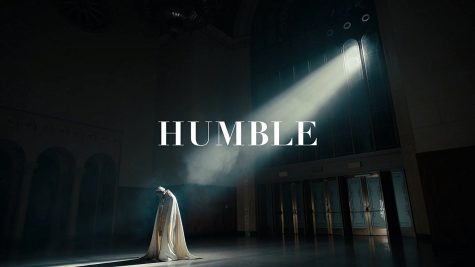WVAU Top Music 2013: #1
December 31, 2013

#1 ALBUM:
Arcade Fire, Reflektor
åÊ
Arcade Fire’s gradual ascent towards true rock stardom has always been endearing, in part because it was obvious that the band wanted it so bad for so long. Their earliest live shows displayed such ridiculous levels of physicality (band members needed helmets for protection) and musical catharsis (acoustic sing-alongs in a church!), it was clear from the beginning that Arcade Fire sought nothing less than to become known as one of the all-time greats. Over the course of seven years, this dream slowly but surely started to come to realization, and with a surprise Album of the Year Grammy victory for The Suburbs, Arcade Fire was poised for world domination with its next record. What would (or could) they do next?
The answer should have surprised no one. What had rock titans such as Talking Heads, U2, and (yes) Coldplay done when they felt they had taken their music to its absolute limits? They hired Brian Eno to provide them with an expanded sense of rhythm and experimentation. And so it was with Arcade Fire, who recruited the closest thing to a modern day Eno (except for, you know, Brian Eno) in James Murphy to produce Reflektor, a stupidly ambitious double-album that contained interweaving themes about “the reflective age” and Greek mythology. It was the band’s boldest, most ambitious music yet – the type of record that can employ David Bowie for mere backing vocals and get away with it. With this album, Arcade Fire demanded to be heard. The result was a full-blown success, and it also happens to be WVAU’s top album of 2013. Right in front of our very eyes, Arcade Fire has become the world-beater it always wanted to be.
Over its two discs, Reflektor manages to offer something for everyone. As is the case with any Murphy production, there are ample amounts of lengthy, groove-infused epics that cast a shadow over anything else that came out during The Great Disco Revival of 2013 (Looking at you, Daft Punk and Justin Timberlake). The variety of influences on Reflektor is dizzying: there’s the punk rock stomp of “Joan of Arc,” the Smiths-y jangle of “You Already Know,” and the Haitian Carnival-inspired “Here Comes The Night Time.” Yet, what is perhaps most impressive about Reflektor is how it retains the band’s enormous sense of heart in the midst of its experimentation. Whereas previous classics such as “Rebellion” and “No Cars Go” promised of mythical getaways, “Afterlife” dares to ask about what comes next when those illusions start to lose their luster. Meanwhile, “Awful Sound” and “It’s Never Over” cast real-life couple Win Butler and Regine Chassange as doomed lovers Orpheus and Eurydice, providing the songs even further emotional weight.
Throughout Reflektor, Butler sings of the fleeting joy that comes with our reliance on social media as a means of interaction: “I thought I found the connector/It was just a reflector.” Fortunately, Arcade Fire showed us better than anybody in 2013 that great music still brings people together in ways few other things can. I’ve heard the songs of Reflektor blasting at joyous house parties, and I’ve also seen them bring comfort in moments of meditative soul-searching – this is music that can resonate with the listener in a variety of occasions. If you’re still in pursuit of that connector, look no further than Arcade Fire.
åÊ
åÊ
By Cameron Meindl
åÊ

#1 SONG:
Arcade Fire, “Afterlife”
åÊ
If you tuned in to the world of independent music this year, it would’ve been difficult to miss the promotional juggernaut that was Arcade Fire. From the post-SNL 30 minute NBC special, to the street-closing outdoor shows, to the goofy anti-fashion outfits and face-paint, to the giant Reflektor street art in major cities, to the not-so-secret concerts, to the “mandatory” formal/costume wear, to those paper mache heads, the band actually harnessed many of the same social media stunt “reflective age” tools they lamented to be everywhere at once.
Inevitably, crossing a multi-million dollar promotional campaign with a fan base as passionate as the band they care about, some expectations are going to be spoiled. Critics in publications such as The Guardian, Vanity Fair, and Spin took issue with the band’s perceived pretentiousness and indulgence, citing the lyrical content, the promo rollout, cultural misappropriation, and their own lofty expectations. But while it’s easy to see how sharp left turns tend to chuck a few people off of the wagon, there’s clearly one exception to the critical groaning about change and disappointment. The fullest realization of the band’s genre-defying synthesis of “Studio 54 and Haitian voodoo,” and more traditional emotive, cathartic indie rock, “Afterlife” is a moment of both artistic and pop music clarity. Arcade Fire’s new “dance music” tricks are here: the emphasis on bongos and percussion, the overwhelming Korg bass tones. But it’s still familiar: the chorus “ohs,” the basic four-chord structure, the musings on death. Where tracks like “Here Comes The Nighttime” and “Flashbulb Eyes” are constructions unique to this Reflektor, bearing little resemblance to anything the band has done previously, “Afterlife” is a refreshing reminder that the band can coexist with itself and its audience, both sonically and thematically.
In an interview on Dutch network NOS, frontman Win Butler mentioned that “When you remove the context, all you’re left with is rhythm, and emotion, and melody. Those are your basic building blocks to connect with people.” Arcade Fire didn’t do anything on this album cycle to strip away the context surrounding their album; quite the opposite. But it’s abundantly clear on tracks like “Afterlife” the immense strength that Butler and his band have over these building blocks. And when the band is long gone, ultimately, this is what people will remember them for.
By Maxwell Tani














